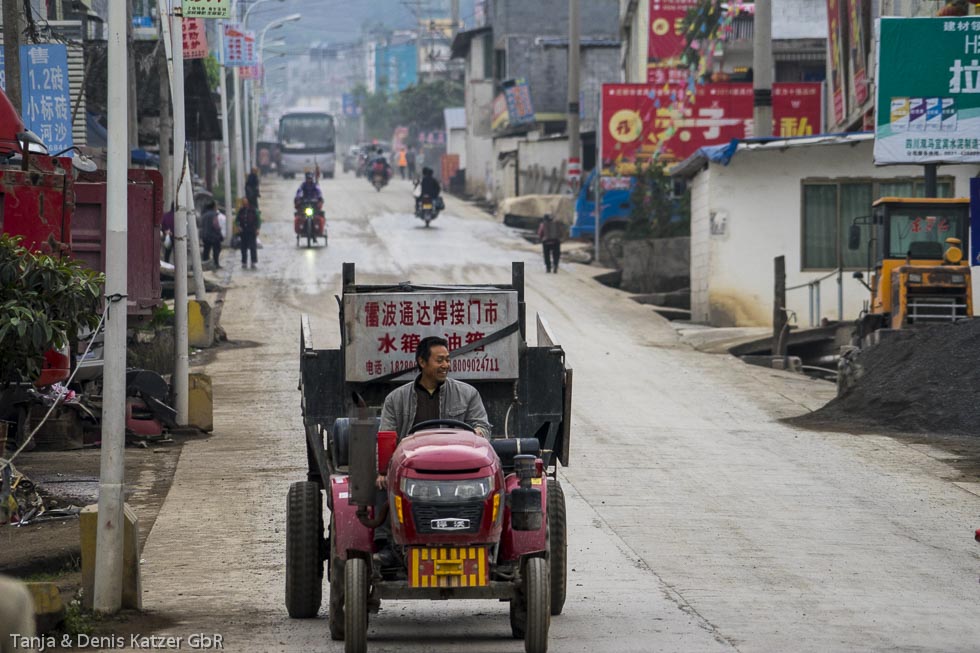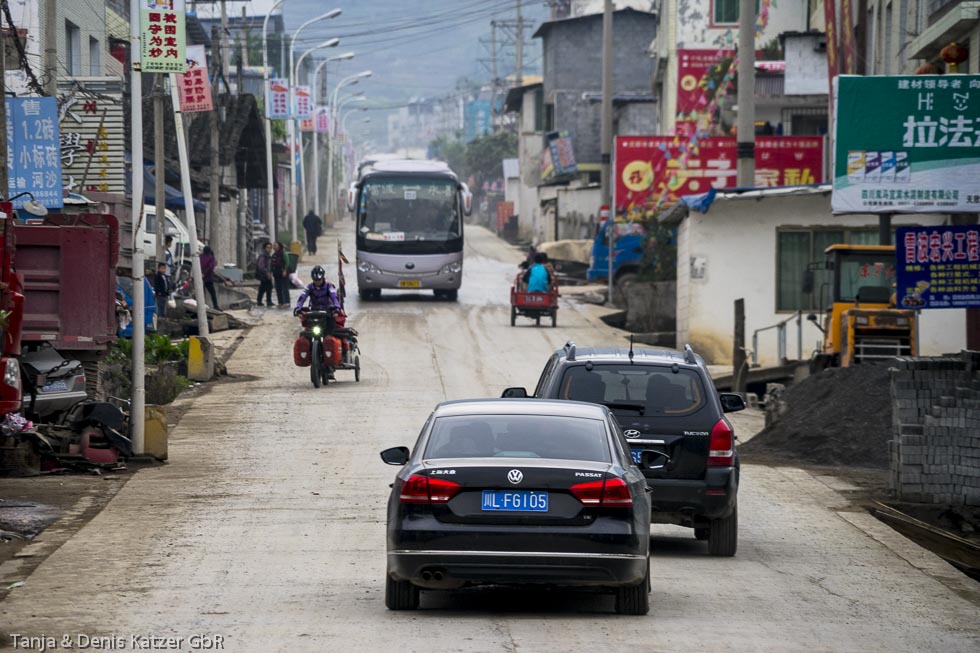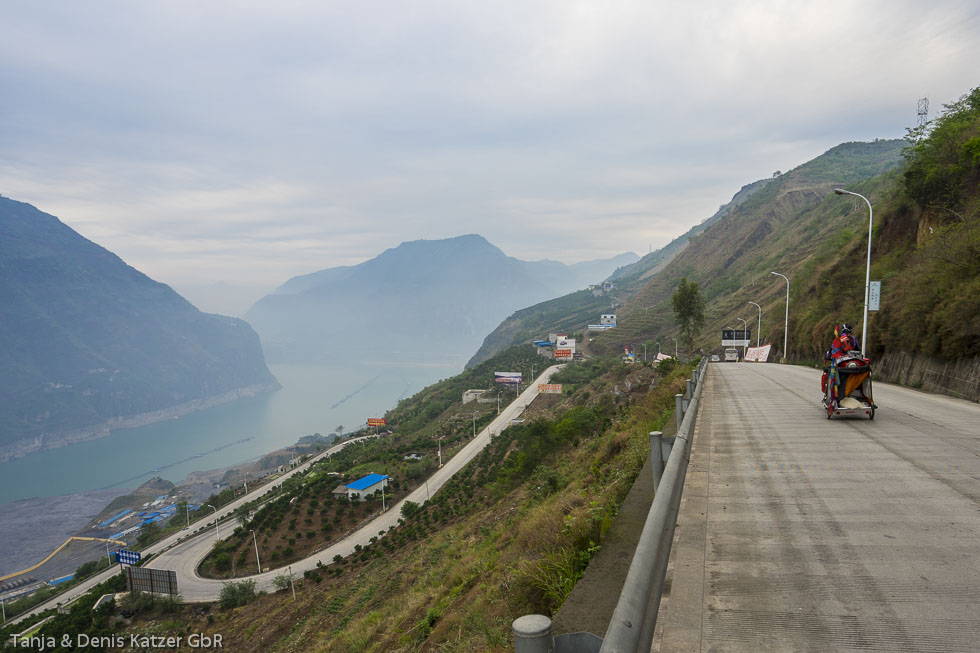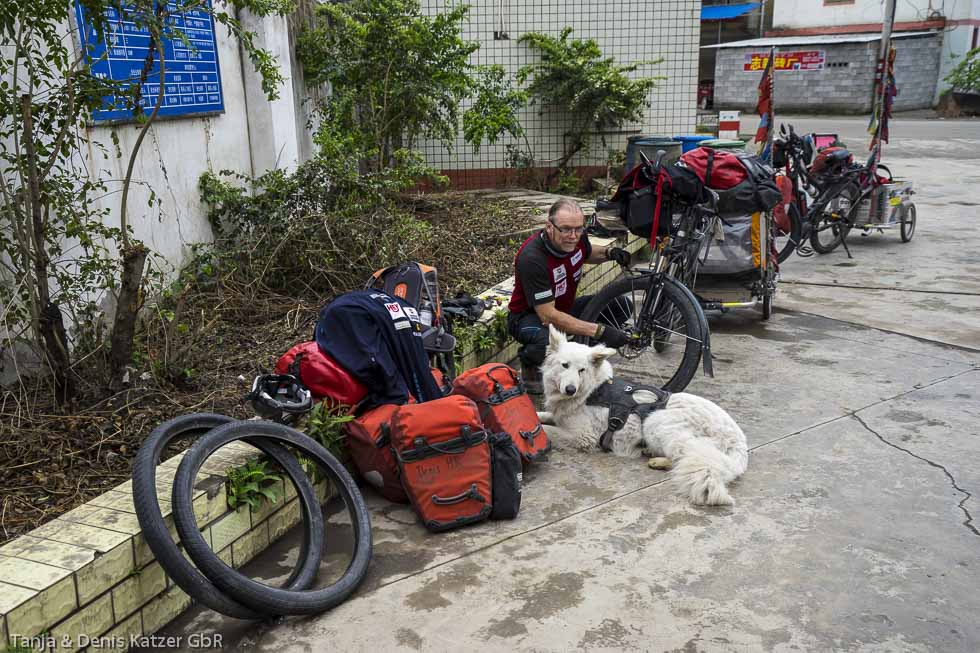
Narrowly avoiding disaster through self-inflicted injury
N 28°16'13.3'' E 103°34'34.9''
Date:
13.04.2016 until 20.04.2016
Day: 290 – 297
Country:
China
Province:
Sichuan
Location:
Leibo
Latitude N:
28°16’13.3”
Longitude E:
103°34’34.9”
Daily kilometers:
7 km
Total kilometers:
16,524 km
As the crow flies:
2 km
Average speed:
10 km/h
Maximum speed:
27.3 km/h
Travel time:
0:43 hrs.
Soil condition:
Asphalt
Maximum height:
1.300 m
Total altitude meters:
30.814 m
Altitude meters for the day:
210 m
Sunrise:
06:43 a.m. – 06:36 a.m.
Sunset:
7:29 pm – 7:33 pm
Temperature day max:
22°C
Temperature day min:
17°C
Departure:
08:00 a.m.
Arrival time:
10:15 a.m.
(Photos of the diary entry can be found at the end of the text).
In order to reach the Vietnamese border by the end of May, we have made a calculation. This means we have to travel almost 300 kilometers every week. Not much, you might think, but as has often been mentioned, it’s not just about cycling, but mainly about getting to know the country and its people. For us, this means not only visiting places of interest, going on hikes and short excursions, but also continuing to write about them. For this reason, we stayed at the hotel for two days with its friendly staff. Although, as almost always, I haven’t finished taking notes and archiving the pictures, we have to move on today. We have a very long day ahead of us with around 125 mountain kilometers. At 8:00 a.m. we are already fully loaded. “Okay?” I call out. “Okay” answers Tanja, whereupon we both start pedaling. Because we are at a high point in the little mountain town, we immediately descend. Some of the lanes are so steep that I’m worried the tires might slip to one side under the load when braking. Luckily it hasn’t rained, so the roads are relatively dry. The shouting and constant honking are nerve-wracking. Sometimes I get the feeling that the Chinese really enjoy honking their horns, because even if no one needs to be warned, they sound them incessantly. Even small mopeds now have horns like a 38-ton truck. Pulling both brakes, we roll down a narrow lane as slowly as possible. Cars come towards us and cut us off recklessly, forcing us to brake hard more than once. As we continue our journey, a few chickens race across the ground on which all kinds of garbage lies. That’s why it’s slippery in some places. “Watch out!” Tanja’s warning call rings in my ears. It takes us a long time to weave our way through the crazy traffic of the small town. At a point where the road goes straight down for about two kilometers, I stop and look at my watch. “I hope we make it in time before the road is closed,” I say to Tanja, who comes to a halt behind me. “It will work out,” she says confidently. Just yesterday evening, our English teacher Richard warned us that the S307 near the village of Zhaojue would be closed from midday because roadworks were being carried out there. You have to be very careful in this region. The roads are not safe and time and again people die there whose cars are swept away by rock avalanches. A few weeks ago, two jeeps were buried under rubble. Six engineers, who had driven there especially to get an impression of the danger of the slope, could only be rescued dead. That was a great tragedy in our region,” he said, “which is why we are a little nervous on this day. “Don’t go too fast,” Tanja warns me as we are about to hurtle down the hairpin bends and serpentines 800 meters into the depths from which we worked our way up here two days ago. “I’ll be careful. But watch out for you too,” I reply and let my Delite roll off. Pulling the front and rear brakes, you descend. Time and again, speedbrakers get in the way, which we roll over with extreme caution so as not to damage our bikes. This is usually a balancing act, as we are so slow when we cross such a heavy barrier that the bike is about to tip over. Suddenly my front brake starts to squeal loudly. “Are the brake pads worn out?” I wonder. I let my vehicle roll on, but the squeaking quickly increases to a loud screech. Then the braking force becomes less and less until it almost stops completely. “What a bummer, and with such a massive gradient,” another thought runs through my mind. Although the speed can still be controlled very well with the rear brake, I realize that before the even more extreme gradient, which begins about 500 meters outside the settlement, I have to find a straight surface where I can put the bike on the stand to change the brake pads. Completely unexpectedly, only 20 meters later, the right brake lever can be pushed further than before. At first I thought I was just imagining it, because the rear brake still works perfectly. However, I believe that her strength is also slowly waning. Then, finally, I discover a gas station on the left-hand side of the road. I pull the brakes to come to a halt. It suddenly shows zero braking effect. To prevent my bike from hitting the concrete wall in front of me, I jump onto the ground with both feet and somehow manage to stop the bike just a few centimeters before the barrier. “Phew, lucky you,” I say to myself. As soon as I get out of the saddle, I pull the rear brake again. I can’t believe it, because she is actually dead. Then Tanja drives up to the gas station and stops next to me. “What’s wrong?” “My brakes have failed.” “Both of them? You’re joking, right?” “No, I’m not joking. My front brakes have already given up the ghost further up. But in this case, it’s definitely the brake pads. I should have checked them first,” I reply. “Well, we were more than lucky. I can’t imagine if your front brake had failed 500 meters down the road. Then you wouldn’t have stopped here and you would have crashed into the next hairpin bends without braking. How can you control your speed in a situation like that?” “Not at all. That would undoubtedly have been the end of me, but at best I would have escaped with nasty injuries,” I say, feeling my whole body trembling with excitement. “And why do you think the brakes suddenly fail?” asks Tanja excitedly. “As I said, the front brake pads are certainly worn. This failure is my fault. With the rear brake, I could imagine that the brake fluid has heated up due to the constant braking.” “And then the brakes fail?” “Could be.”
We rest for a few minutes to get our emotions back into balance. Then I set about researching the cause. The brake pads on my front brake are completely worn out. Before I replace it, I check the rear brake and lo and behold, it works again as if I had only imagined the failure. In a later phone call with Magura I find out that our brakes are designed for a maximum load of 150 kg. But as I’m carrying a trailer, the load, our dog Ajaci and my own body weight of around 230 kg on the tires, it’s no wonder that the brake fluid started to boil on the extreme gradient and the brakes no longer worked. “You should have fitted larger brake discs,” I heard the expert say. Ultimately, I am glad that there is a reasonable explanation for this failure and that none of our suppliers are responsible for it. Magura and Riese und Müller couldn’t have known that we were loading so much luggage onto the systems and I never thought that a heavy load could cause brake fluid to boil. As I have traveled a lot with horses, camels and elephants during our expeditions, I have to admit that I still have a lot to learn about bikes. The bottom line is that in future I will always make sure that the loaded weight is compatible with the load capacity of the brakes and other components. But, I must apologize at this point, nobody is perfect and I am willing to learn every day and remain open to new things. “And what do you think? Can we continue driving under these conditions?” I asked the expert. “I can’t take that decision away from them. But if they haven’t had any problems over the last 30,000 meters of altitude, it will continue to work. In their case, several unfortunate factors came together. If they had changed the front brake pads in time, nothing would probably have happened because the weight to be braked would have been distributed over two systems. If they were to continue riding, they would have to take breaks in good time on steep descents to allow the system to cool down,” he advised me.
I make another fatal mistake when changing the brake pads. Because one of the brake cylinders is a bit stuck, I press on the top of the brake lever to free it, which causes it to pop out and fall to the ground, spilling all the brake fluid onto the asphalt. “What a load of crap!” I curse indignantly. I push the brake cylinder back into its opening, but the brake fluid is now missing. “We have to turn back. This is a technical disaster,” I say, shocked. “What, like a technical disaster?” asks Tanja. “I made a mistake during installation. If the brake pads are removed, you must never operate the brake lever. At least I think I read that in the instructions once.” “And you pulled it?” “Yes. Just a little, but that was enough to make one of the four cylinders fall out. Now I have to put new brake fluid in the system. I’ve never done that before. I think we should go back to the hotel. I’ll do the repair there in peace.” “Hm, it’s not so bad. It’s good that nothing happened to you. Everything else is unimportant. And don’t blame yourself. Where there’s wood, there are chips,” Tanja reassures me as she often does.
After reloading the bikes, we cycle up the four kilometers that we have just rolled down the mountain and check back into the hotel. This time they don’t cause us any problems. Everyone thinks we only went on a short trip. We get the same room as before. I immediately write an e-mail to Magura. A technician from the service department calls me back immediately and explains what I mentioned earlier in the text. “And is the system still tight if I simply reinsert the brake cylinder after it has fallen out?” I ask, quick-wittedly. “Not necessarily Mr. Katzer. If a cylinder is pushed out of the brake caliper, as in your case, the entire brake caliper should be replaced. Especially if a brake system has already clocked up a few thousand kilometers.” “Oh no. That means I need a new brake caliper?” “Yes.” On the same day, a DHL shipment is sent from Magura to Bosch in Shanghai. The parcel should be there in three days, but it takes seven days because of a few customs regulations. The parcel has been on its way from Shanghai to Leibo since yesterday. We spend the waiting time recording our experiences. We are now almost part of the hotel’s inventory. Everyone is very friendly to us. We are now expecting our important spare parts to arrive any day now. And when they are there I hope to be able to install a new brake system and fill it properly with brake fluid. This may be a small matter for experts, but I personally have respect for this work. During the preparation for our e-bike expedition, I went to Riese und Müller and attended a workshop lasting several days where I learned everything I needed to know to be able to repair the Delite in the pampas. I also watched several times how brakes are filled. However, as this is now a good 1 ½ years behind me, I am nervous. “That won’t be a problem for you,” says Tanja with her usual confidence. “Don’t overestimate it,” I reply with a laugh…
If you would like to find out more about our adventures, you can find our books under this link.
The live coverage is supported by the companies Gesat GmbH: www.gesat.com and roda computer GmbH http://roda-computer.com/ The satellite telephone Explorer 300 from Gesat and the rugged notebook Pegasus RP9 from Roda are the pillars of the transmission.





